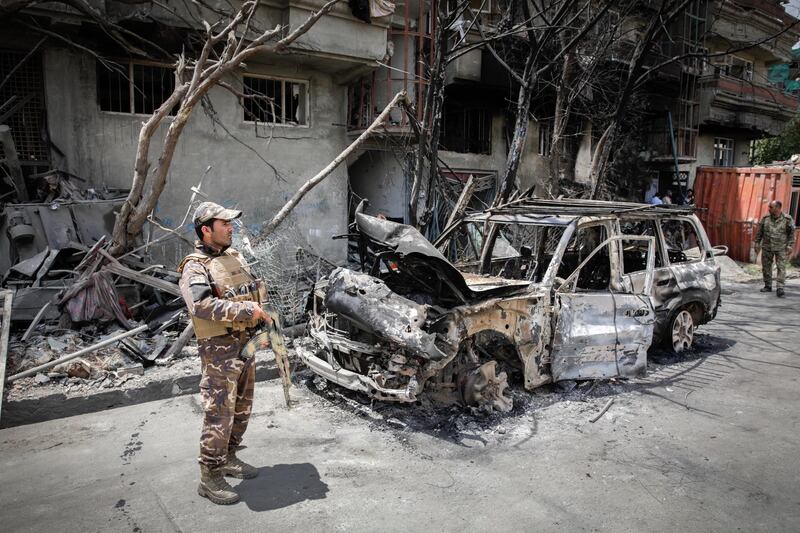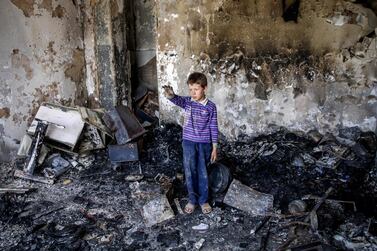A roadside bomb in Afghanistan on Wednesday killed 35 people travelling on a bus, mostly woman and children, and injured 27 others.
The attack, which came a day after the United Nations said civilians were being killed and wounded at a "shocking" level in Afghanistan's war, happened at about 6am, authorities said.
Security has been deteriorating across Afghanistan this year, with the Taliban and Islamic State fighters mounting near-daily attacks on Afghan forces, government employees and civilians.
"A passenger bus travelling on the Kandahar-Herat highway hit a Taliban roadside bomb," said Muhibullah Muhib, the spokesman for the police force in Farah province neighbouring Iran. All were civilians, mostly women and children, he said
The blast on the main road linking the provincial capitals of Herat and Kandahar happened in the Ab Khorma area of Farah province, said Mr Muhib.
"The bomb was freshly planted by the Taliban insurgents to target Afghan and foreign security forces," he said, adding most of the dead or injured were women and children.
Farooq Barakzai, a spokesman for Farah's governor, confirmed the toll but gave a warning that it may rise.
A senior official at United Nations Mine Action Service in Kabul said initial reports suggested a bomb with a pressure plate was used in the bus blast in Farah.
"These are used by the anti-government groups to target convoys or control population movement. They are indiscriminate and currently inflict hundreds of civilian casualties," said Mohammad Wakil Jamshidi, deputy programme manager at UNMAS.
"As peace negotiations continue, there is scope for the removal of these devices and other explosive ordnance to generate peace-building dividends," he said.
No militant group claimed responsibility. A Taliban official denied responsibility and said their fighters were not responsible for planting landmines in the area.
"The blast has not been conducted by the Taliban, we are investigating the incident," said spokesman Zabihullah Mujahid.
The group has endured since the US toppled the regime in 2001. At inter-Afghan talks earlier this month, the Taliban made a vague pledge to reduce civilian casualties but gave few details as to what this means.
The blast comes ahead of the resumption of peace talks between US officials and Taliban representatives, who are hoping to strike a deal on a timetable for the withdrawal of foreign forces in exchange for security guarantees by the Taliban.
In eastern Nangarhar province, on the border with Pakistan, clashes between the Taliban and Afghan forces on Wednesday caused civilian casualties.
Sohrab Qaderi, a member of Nangarhar's provincial council, said Afghan special forces conducted operations in the Gandumak area, which is under Taliban control.
"Two Taliban fighters and five civilians were killed," said Qaderi.
Despite the talks between the Taliban and the US, violence has been relentless.
Government and aid officials say the number of people being killed and maimed is rising because of new explosives planted by the Taliban, who now control more territory than at any point since their ouster nearly 18 years ago.
Civilians have long paid a disproportionate price in the nearly 18 years since the US invaded Afghanistan.
On Tuesday, the UN released a report showing that casualties had dropped 27 per cent in the first half of 2019 compared to the same period last year, which was a record – but nonetheless, 1,366 civilians were killed and another 2,446 injured.
Child casualties represented almost a quarter of civilian fatalities.
The UN also said that US and pro-government forces caused more civilian deaths than the Taliban and other insurgent groups for the second quarter running.
It branded efforts to reduce the violence "insufficient".
The bloodshed is expected to rise after the start this week of official campaigning in Afghanistan's presidential election, set for September 28.
At least 20 people were killed on Sunday, the first official day of the campaign, and 50 wounded when a suicide bomber and gunmen attacked the Kabul office of Afghan President Ashraf Ghani's running mate, Amrullah Saleh.
There are also doubts the election will happen at all, with lingering questions about whether Afghanistan should hold a crucial poll amid a months-long, US-led push to forge a peace deal with the Taliban.
This week, US Secretary of State Mike Pompeo said Mr Trump wanted to begin withdrawing troops before the vote, though he emphasised in comments to reporters on Tuesday that there was "no deadline".
But the push has ignited widespread concern among Afghans that in Washington's rush to exit its longest war the Taliban will be returned to some semblance of power.







